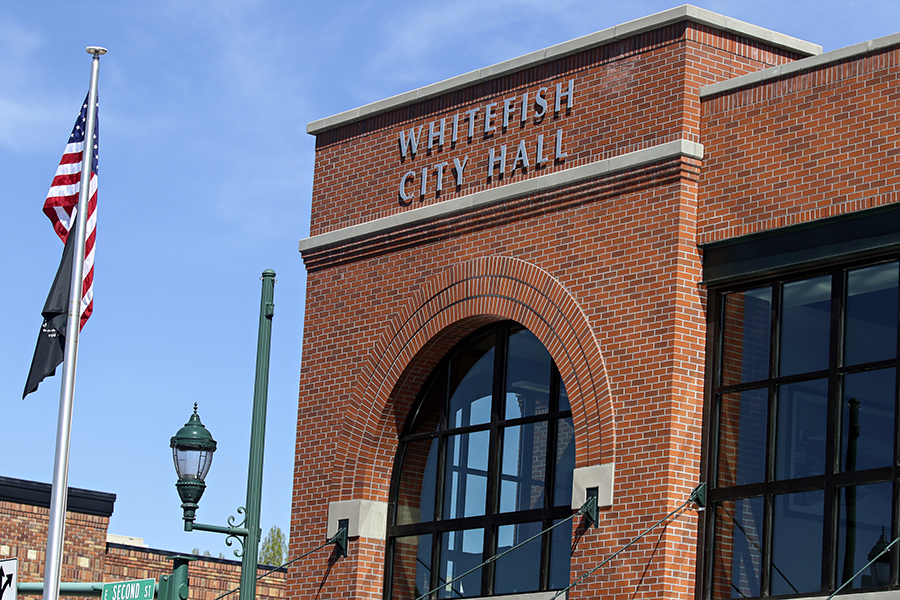The Whitefish City Council on Sunday morning enacted an emergency ordinance prohibiting hotels and short-term rentals from accepting reservations for non-essential purposes through April 30, becoming the first city in Montana to do so and marking the municipality’s most dramatic step to date to halt the spread of coronavirus.
Gathering for a special session remotely via video conference, members of council and city administrators said they proposed the temporary restrictions in light of new data revealing a trend of individuals leaving areas with high concentrations of COVID-19 cases in order to “shelter in place” in small, cloistered communities like Whitefish.
The ordinance excludes reservations for essential purposes including government, health care, law enforcement, domestic violence victims, personnel responding to the COVID-19 emergency, essential workers as defined by federal and state guidelines, family members of those seeking medical treatment, and those individuals who have a medical recommendation to quarantine outside of their home.
The emergency ordinance, which council approved unanimously, comes just days after city officials urged lodging establishments and short-term rentals to voluntarily stop accepting new reservations. That move was prompted by a Montana Free Press story citing data from AirDNA — a company that analyzes usage data related to the short-term rental industry — showing the number of vacation rental reservations in Montana had skyrocketed in recent weeks, especially in the Flathead Valley.
Reported rental revenue in Whitefish during the first half of March grew from $1.1 million in 2019 to $2.1 million in 2020, a 92% increase, according to the analysis.
The ordinance also bars walk-in guests at hotels and motels and forces lodging establishments to cancel existing reservations between now and April 30. The measure gives Whitefish City Manager Dana Smith the authority to extend the emergency ordinance beyond April 30 without council approval.
If a business does not comply with the measure, the city’s main punitive recourse is to pull its license, Smith said.
According to Whitefish Mayor John Muhlfeld, about 70% of lodging establishments and short-term rental owners complied with the request on a voluntary basis, but as the need to curb the spread of illness gains urgency it has since become clear that more stringent measures were needed, he said.
“I did not arrive at this decision lightly, and I want to thank the over 70 percent of lodging establishments that voluntarily ceased taking reservations,” Muhlfeld said. “I know you are making a big sacrifice and I want to applaud you for doing so. From my perspective, when you consider the governor’s 14-day quarantine order for travelers arriving from out of state, this just adds another layer of protection to our town.”
City officials will send letters to the roughly 175 lodging facilities and short-term rentals in Whitefish explaining the new restrictions, as well as how to implement it.
Recently, at least one vacation rental business in Whitefish sent out a promotion encouraging people from out of state to seek refuge in the area. The move was heavily criticized on social media, and the promotion was later dropped. The company apologized.
Discussions during Sunday’s special council session addressed concerns about whether the ordinance strikes a tone of arrogant exclusivity and explored ways to ensure that safe options remain in place for residents fleeing domestic violence situations. Still, members of the public expressed overwhelming support for the measure.
Rhonda Fitzgerald, owner of the Garden Wall Inn in downtown Whitefish, said the ordinance — like nearly every new measure enacted in response to the public health crisis — will deal a devastating financial blow to the business community. However, she said the impact would be far greater in the absence of aggressive and immediate action.
“Whitefish will become first city in Montana to adopt this, but we are also by far the city with the most short-term rentals in the state,” Fitzgerald said prior to the council’s vote. “The impact of these virus vacationers is already being felt. Hundreds of reservations have been placed on Airbnb and Vrbo in our zip code. There is no point in staying home to stop the spread if you leave your back door wide open. All you have to do is go to the grocery store and see all the out-of-state plates to see what’s already occurring.”
With a statewide stay-at-home order in place through April 10 — and which Gov. Steve Bullock pledged to extend by at least two weeks — supporters of the new local measure asked about the efficacy of closing non-essential businesses and sheltering in place if the city continues to allow and accommodate an inrush of visitors.
“It makes no sense to shut down bars and restaurants yet allow visitors come in from potentially infected areas and rent a room or a condo,” Doug Rommereim, co-owner of the Great Northern Bar in Whitefish, said. “This is a hardship for us all, but it’s only going to be worse if we don’t take precautions now.”
The Whitefish business community is already losing more than $732,000 in daily revenue, according to a study released last week, offering a snapshot of the downturn that local economies may have to endure for months to come.
But the number of reported COVID-19 cases in Montana continues to rise, and on April 5 reached 286 as the statewide tally added five more positives, including a Flathead man in his 70s.
Flathead County now has 24 confirmed cases of COVID-19, four of which were reported in the last 24 hours. Gallatin County, another tourism destination, has by far the most reported cases in the state with 110.
